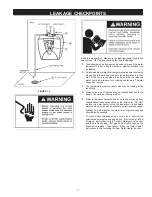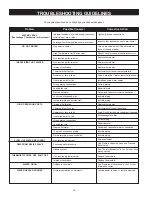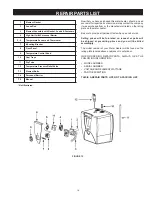
8
fiGure 4.
water pipinG pressure test
This section is only for the manufacturer installing the
water heater when the installation is to comply with H.U.D.
Standards.
When testing the water ways, H.U.D. Standards state:
“Water distribution system: All water piping in the water
distribution system shall be subjected to a pressure test.
The test shall be made by subjecting the system to air or
water at 100 psi for 15 minutes without loss of pressure.
when air pressure is used, the water heater shall not
be connected during the test
.”
temperature- pressure relief valve
This water heater shall not be connected to any heating
systems or component(s) used with a non-potable water heating
appliance.
Toxic chemicals, such as those used for boiler treatment shall
not be introduced into this system.
Water supply systems may, because of such events as
high line pressure, frequent cut-offs, the effects of water
hammer among others, have installed devices such
as pressure reducing valves, check valves, back flow
preventers, etc. to control these types of problems. When
these devices are not equipped with an internal by-pass,
and no other measures are taken, the devices cause the
water system to be closed. As water is heated, it expands
(thermal expansion) and closed systems do not allow for
the expansion of heated water.
The water within the water heater tank expands as it is heated
and increases the pressure of the water system. If the relieving
point of the water heater’s temperature-pressure relief valve
is reached, the valve will relieve the excess pressure.
the
temperature-pressure relief valve is not intended for the
constant relief of thermal expansion.
This is an unacceptable
condition and must be corrected.
It is recommended that any devices installed which could create
a closed system have a by-pass and/or the system have an
expansion tank or device to relieve the pressure built by thermal
expansion in the water system. Expansion tanks are available
for ordering through a local plumbing contractor. Contact the
local water supplier and/or a service agency for assistance in
controlling these situations.
note:
to protect against untimely corrosion of hot and
cold water fittings, it is strongly recommended that di-
electric unions or couplings be installed on this water
heater when connected to copper pipe.
figure 4 shows the typical attachment of the water piping
to the water heater. the water heater is equipped with 1/2
inch npt water connections.
note:
if using copper tubing, solder tubing to an adapter
before attaching the adapter to the cold water inlet
connection. do not solder the cold water supply line directly
to the cold water inlet, it will harm the dip tube and damage
the tank.






































